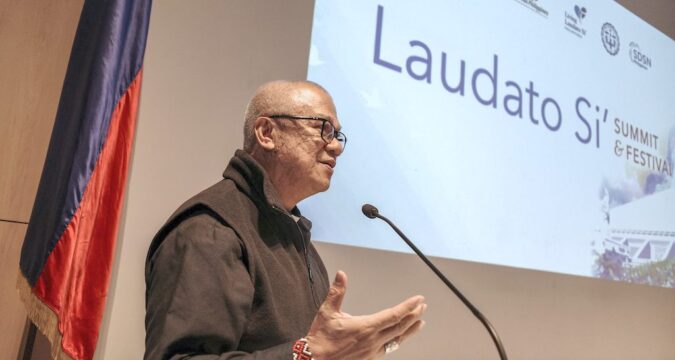
MANILA (LiCAS News): Bishop Gerardo Alminaza of San Carlos, vice president of Caritas Philippines, warned that the ecological crisis cannot be separated from the moral crisis of corruption.
Speaking at the Laudato Si’ Summit and Festival at the Ateneo de Manila University on September 4, Bishop Alminaza urged Church leaders, educators, and the young people to demand accountability from those in power.
The bishop described overpriced and substandard flood-control projects as “monuments to greed” that fail to protect lives.
“Corruption not only wastes money. It kills. It kills trust. It kills justice. And in the context of disasters, it kills lives,” he said, adding that “greed is not an accident. It is a choice. And when those in power choose greed, the poor pay the price.”
He stressed that ecological conversion must be rooted in moral conversion and warned that “a society that cannot be honest in governance will never be honest in protecting creation.”
Corruption not only wastes money. It kills. It kills trust. It kills justice. And in the context of disasters, it kills lives
Bishop Alminaza
Bishop Alminaza presented the Catholic Church’s ecological initiatives, including the establishment of Integral Ecology Ministries in dioceses, divestment from coal and mining by 2025, and rejection of “dirty donations.”
He said these steps are part of a broader commitment by the Catholic Bishops’ Conference of the Philippines [CBCP] to align Church finances and institutions with the values of Laudato Si’.
The programmes, he noted, aim not only to restore ecosystems but also to protect vulnerable communities that bear the brunt of climate disasters and environmental destruction.
The bishop also highlighted campaigns for debt cancellation, loss and damage reparations, bamboo reforestation, zero-waste programmes, recognition of Rights of Nature, and the protection of the Verde Island Passage, considered the “centre of the centre” of marine biodiversity.
As we celebrate the 500 years of Christianity in the Philippines. The Chaplaincy to Filipino Migrants organises an on-line talk every Tuesday at 9.00pm. You can join us at:
https://www.Facebook.com/CFM-Gifted-to-give-101039001847033
Bishop Alminaza explained that these initiatives reflect the Church’s effort to respond to both global and local crises: addressing climate justice on the international stage while safeguarding critical ecosystems and livelihoods in the Philippines.
The Verde Island Passage, he stressed, is not only a national treasure but also a vital resource for the world’s biodiversity, now threatened by industrial projects and pollution.
He urged students to not only prepare for the future, but to act in the present, noting that young people are already driving climate strikes, developing solutions, and pressing Church leaders to act consistently
The bishop affirmed that schools and young people play a crucial role, calling them “cradles of conscience.”
He urged students to not only prepare for the future, but to act in the present, noting that young people are already driving climate strikes, developing solutions, and pressing Church leaders to act consistently.
“The Church needs you. The world needs you. God is calling you,” Bishop Alminaza said.
He called for conversion of lifestyle, policy, and heart, reminding participants that ecological conversion requires seeing “the cry of the earth, the cry of the poor, the cry of our children” as one.
Pablo Virgilio Cardinal David of Kalookan, head of the Catholic Bishops’ Conference of the Philippines, opened the summit on September 4 with a denunciation of corruption and greed, warning that the country’s worsening ecological and social crises are rooted in what he called avarice.
“You cannot serve God and mammon,” Cardinal David said adding that society’s avarice is driven by “our obsessive anxiety about material wealth, about food, drink, clothing, status, and tomorrow’s survival” which blinds people to what truly matters.








